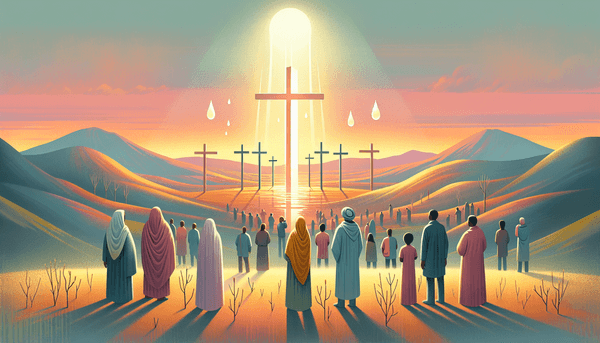The Nature of Jesus' Sacrifice
The Bible declares that 'all have sinned and fall short of the glory of God' (Romans 3:23), setting the stage for the necessity of atonement. Sin, by its very nature, demands a penalty, which is death (Romans 6:23). Yet, in the midst of this bleak predicament, God's profound love for humanity shines forth, sending His Son, Jesus, to bridge the chasm sin created. 'But God demonstrates His own love toward us, in that while we were still sinners, Christ died for us' (Romans 5:8). By offering Himself on the cross, Jesus bore the full weight of humanity's sins, fulfilling the demands of divine justice. This gift of grace is not merely a historical event; it echoes through time, offering redemption and new life to all who believe, as evidenced by the transformative promise found in 2 Corinthians 5:17.
The Mystery of Jesus' Incarnation and Knowledge
The incarnation of Jesus, God made flesh (John 1:14), remains one of the profound mysteries of Christian faith. Fully divine, yet fully human, He experienced the limitations of humanity, yet without sin (Hebrews 4:15). This unique dual nature allowed Him to be the perfect mediator between God and mankind (1 Timothy 2:5). His incarnation also brings into focus the dynamic relationship within the Trinity, as Jesus willingly submitted to the Father's will, particularly in the Garden of Gethsemane, when He prayed, 'not as I will, but as You will' (Matthew 26:39). While Jesus' knowledge in His earthly form had limitations, as He Himself stated regarding the day and hour of His return (Mark 13:32), His life and teachings, particularly those addressing the anxieties and stresses of life, continue to inspire believers to live in hopeful anticipation of His second coming (Titus 2:13).
The Bible's Stance on Slavery
The Bible's engagement with the issue of slavery is often misunderstood, requiring thoughtful examination of its historical context. While it does not prescribe a clear mandate on the institution, it does provide principles that, over time, have inspired movements for justice and equality. In the Old Testament, laws were given to regulate the treatment of slaves, including provisions for their release (Exodus 21:2). The New Testament further evolves this discourse, as Apostle Paul calls for mutual respect and fairness between slaves and masters, challenging societal norms of his time (Ephesians 6:9). These teachings laid the groundwork for Christians who, motivated by the overarching biblical themes of love and liberation found in Christ (Galatians 5:14; John 8:36), fervently advocated for the abolition of slavery, embodying the belief that in Christ, 'there is neither slave nor free' (Galatians 3:28).
Conclusion
As we reflect upon the theological tapestry woven through the Bible, the sacrifice of Jesus Christ stands out as the central thread, vital to understanding God's plan for humanity. The atonement achieved through Christ's death and resurrection extends an invitation to each of us to embrace a life transformed by grace. These profound truths challenge us to delve deeper into our faith, to seek understanding, and to live out the implications of this great sacrifice. The hope and promise of eternal life, secured through Jesus, offer both comfort and a call to action as we navigate the complexities of our world, striving to reflect His love in our lives.






